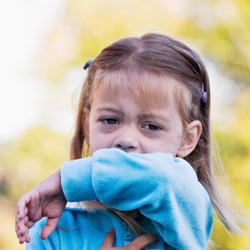
Pneumonia in Children
17 May 2007
Pneumonia is a term that means lung infection. It can be caused by infection by germs, including bacteria, viruses, and parasites. Though most children are able to get better at home with treatment from their doctor, pneumonia can be very serious and can require hospitalization. Untreated pneumonia can lead to serious illness and even death. So it is important for a child with pneumonia to get treatment.
Symptoms of Pneumonia
Pneumonia is caused by an infection that spreads to the lungs. The child often begins with symptoms of a cold or sore throat. Symptoms then get worse as pneumonia develops. Symptoms vary widely, but often include:
- Fever, chills
- Cough (either dry or producing thick phlegm)
- Wheezing or fast breathing
- Chest pain
- Tiredness
- Muscle pain
- Headache
Any child with cold or flu symptoms that don’t seem to be getting better should be checked by a doctor.
Treating Pneumonia
- Bacterial pneumonia: If the cause of the infection is found to be a bacteria, antibiotics will be prescribed. Your child should start to feel better within 24–48 hours of starting this medication. It is very important that the child finish ALL of the antibiotic medication, even if he or she feels better.
- Viral pneumonia: Antibiotics will not help viral pneumonia. This infection will go away on its own. To help your child feel more comfortable, your doctor may suggest medication for the child’s symptoms.
Follow any instructions your doctor gives you for treating your child’s illness. A very sick child may need to be admitted to the hospital for a short time. In the hospital, the child can be made comfortable and may be given fluids and oxygen.
Helping Your Child Feel Better
If your doctor feels it is safe to treat the child at home, do the following to help him feel more comfortable and get better faster:
- Keep the child quiet and be sure he or she gets plenty of rest.
- Feed your child plenty of clear, room-temperature fluids, such as water or apple juice.
- To keep an infant’s nose clear, use a rubber bulb suction device to remove any mucus (sticky fluid).
- Elevate your child’s head slightly with pillows to make breathing easier.
- Don’t allow anyone to smoke in the house.
- Treat a fever and aches and pains with children’s acetaminophen. DO NOT give a child aspirin.
- Do not use cough medicine unless your doctor recommends it.
Preventing the Spread of Infection
- Wash your hands with warm water and soap often, especially before and after tending to your sick child.
- Limit contact between a sick child and other children.
- Do not let anyone smoke around a sick child.
When to Call the Doctor
Call your doctor right away any time you see signs of distress in your child, including:
- Harsh, persistent, or wheezy cough.
- Trouble breathing.
- Severe headache.
- Fever over 102°F.
